Confidentiality- Role of a Nurse in Healthcare Management
VerifiedAdded on 2023/06/15
|7
|1589
|343
AI Summary
This article discusses the importance of confidentiality in healthcare settings and the role of nurses in maintaining it. It also highlights the laws and regulations related to patient confidentiality and exceptions to the duty of confidentiality.
Contribute Materials
Your contribution can guide someone’s learning journey. Share your
documents today.
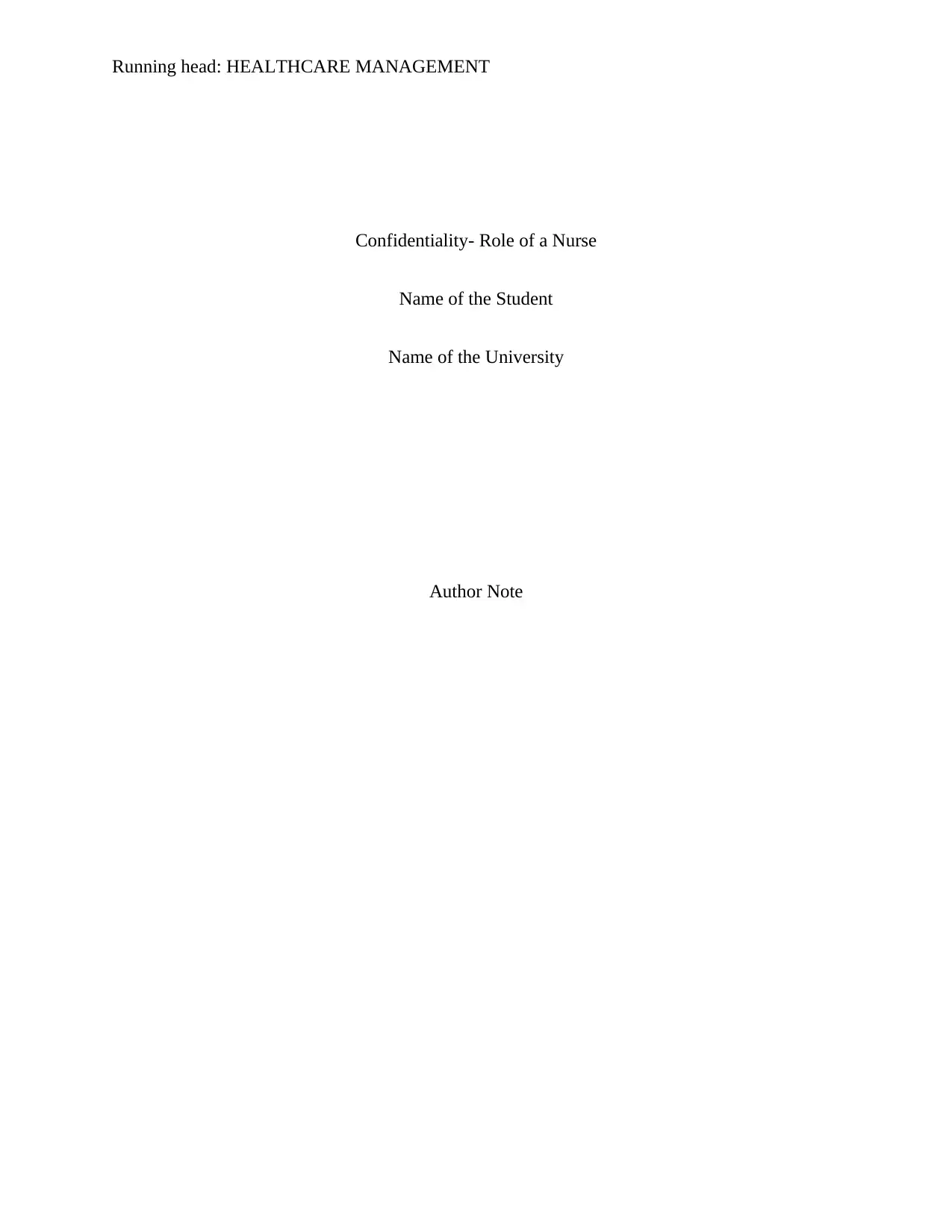
Running head: HEALTHCARE MANAGEMENT
Confidentiality- Role of a Nurse
Name of the Student
Name of the University
Author Note
Confidentiality- Role of a Nurse
Name of the Student
Name of the University
Author Note
Secure Best Marks with AI Grader
Need help grading? Try our AI Grader for instant feedback on your assignments.
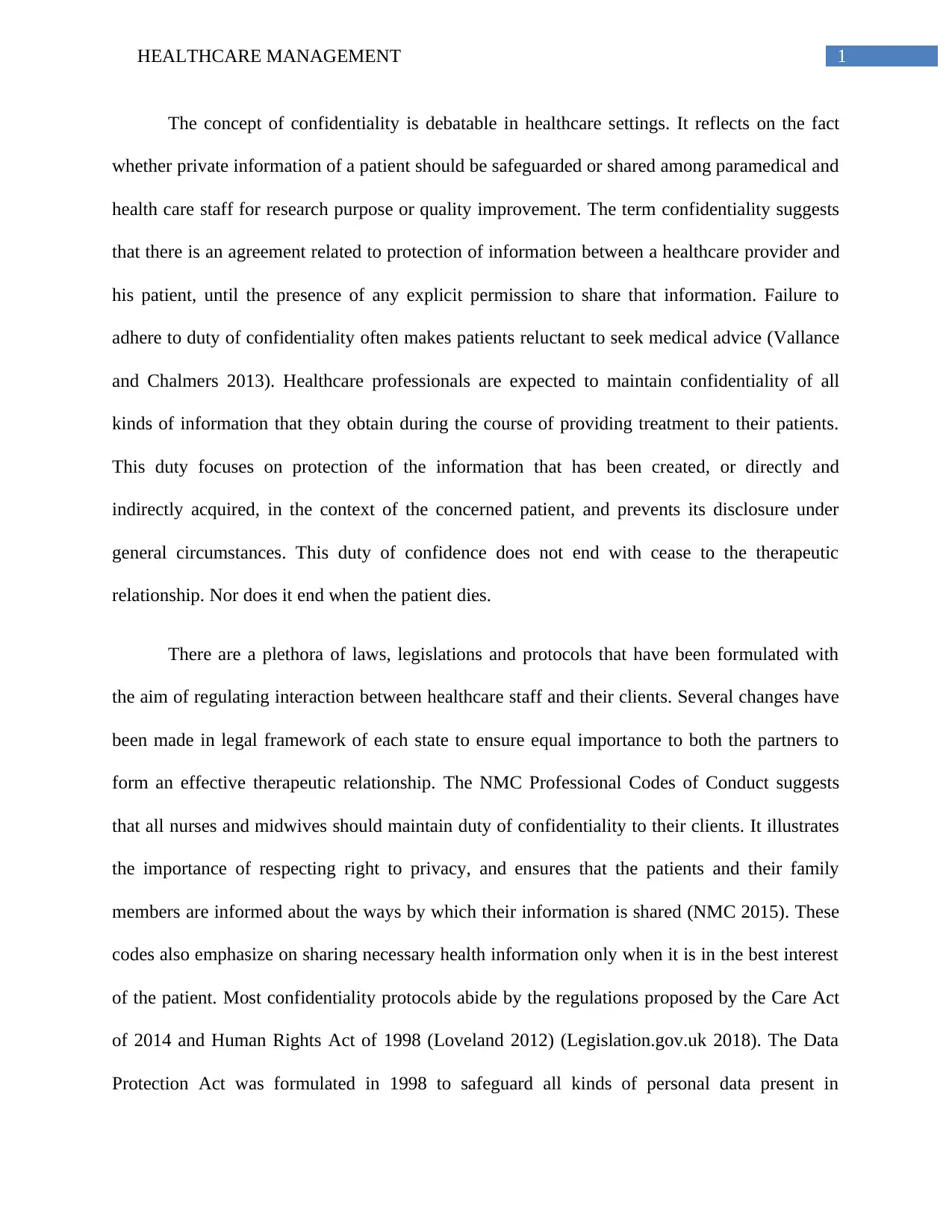
1HEALTHCARE MANAGEMENT
The concept of confidentiality is debatable in healthcare settings. It reflects on the fact
whether private information of a patient should be safeguarded or shared among paramedical and
health care staff for research purpose or quality improvement. The term confidentiality suggests
that there is an agreement related to protection of information between a healthcare provider and
his patient, until the presence of any explicit permission to share that information. Failure to
adhere to duty of confidentiality often makes patients reluctant to seek medical advice (Vallance
and Chalmers 2013). Healthcare professionals are expected to maintain confidentiality of all
kinds of information that they obtain during the course of providing treatment to their patients.
This duty focuses on protection of the information that has been created, or directly and
indirectly acquired, in the context of the concerned patient, and prevents its disclosure under
general circumstances. This duty of confidence does not end with cease to the therapeutic
relationship. Nor does it end when the patient dies.
There are a plethora of laws, legislations and protocols that have been formulated with
the aim of regulating interaction between healthcare staff and their clients. Several changes have
been made in legal framework of each state to ensure equal importance to both the partners to
form an effective therapeutic relationship. The NMC Professional Codes of Conduct suggests
that all nurses and midwives should maintain duty of confidentiality to their clients. It illustrates
the importance of respecting right to privacy, and ensures that the patients and their family
members are informed about the ways by which their information is shared (NMC 2015). These
codes also emphasize on sharing necessary health information only when it is in the best interest
of the patient. Most confidentiality protocols abide by the regulations proposed by the Care Act
of 2014 and Human Rights Act of 1998 (Loveland 2012) (Legislation.gov.uk 2018). The Data
Protection Act was formulated in 1998 to safeguard all kinds of personal data present in
The concept of confidentiality is debatable in healthcare settings. It reflects on the fact
whether private information of a patient should be safeguarded or shared among paramedical and
health care staff for research purpose or quality improvement. The term confidentiality suggests
that there is an agreement related to protection of information between a healthcare provider and
his patient, until the presence of any explicit permission to share that information. Failure to
adhere to duty of confidentiality often makes patients reluctant to seek medical advice (Vallance
and Chalmers 2013). Healthcare professionals are expected to maintain confidentiality of all
kinds of information that they obtain during the course of providing treatment to their patients.
This duty focuses on protection of the information that has been created, or directly and
indirectly acquired, in the context of the concerned patient, and prevents its disclosure under
general circumstances. This duty of confidence does not end with cease to the therapeutic
relationship. Nor does it end when the patient dies.
There are a plethora of laws, legislations and protocols that have been formulated with
the aim of regulating interaction between healthcare staff and their clients. Several changes have
been made in legal framework of each state to ensure equal importance to both the partners to
form an effective therapeutic relationship. The NMC Professional Codes of Conduct suggests
that all nurses and midwives should maintain duty of confidentiality to their clients. It illustrates
the importance of respecting right to privacy, and ensures that the patients and their family
members are informed about the ways by which their information is shared (NMC 2015). These
codes also emphasize on sharing necessary health information only when it is in the best interest
of the patient. Most confidentiality protocols abide by the regulations proposed by the Care Act
of 2014 and Human Rights Act of 1998 (Loveland 2012) (Legislation.gov.uk 2018). The Data
Protection Act was formulated in 1998 to safeguard all kinds of personal data present in
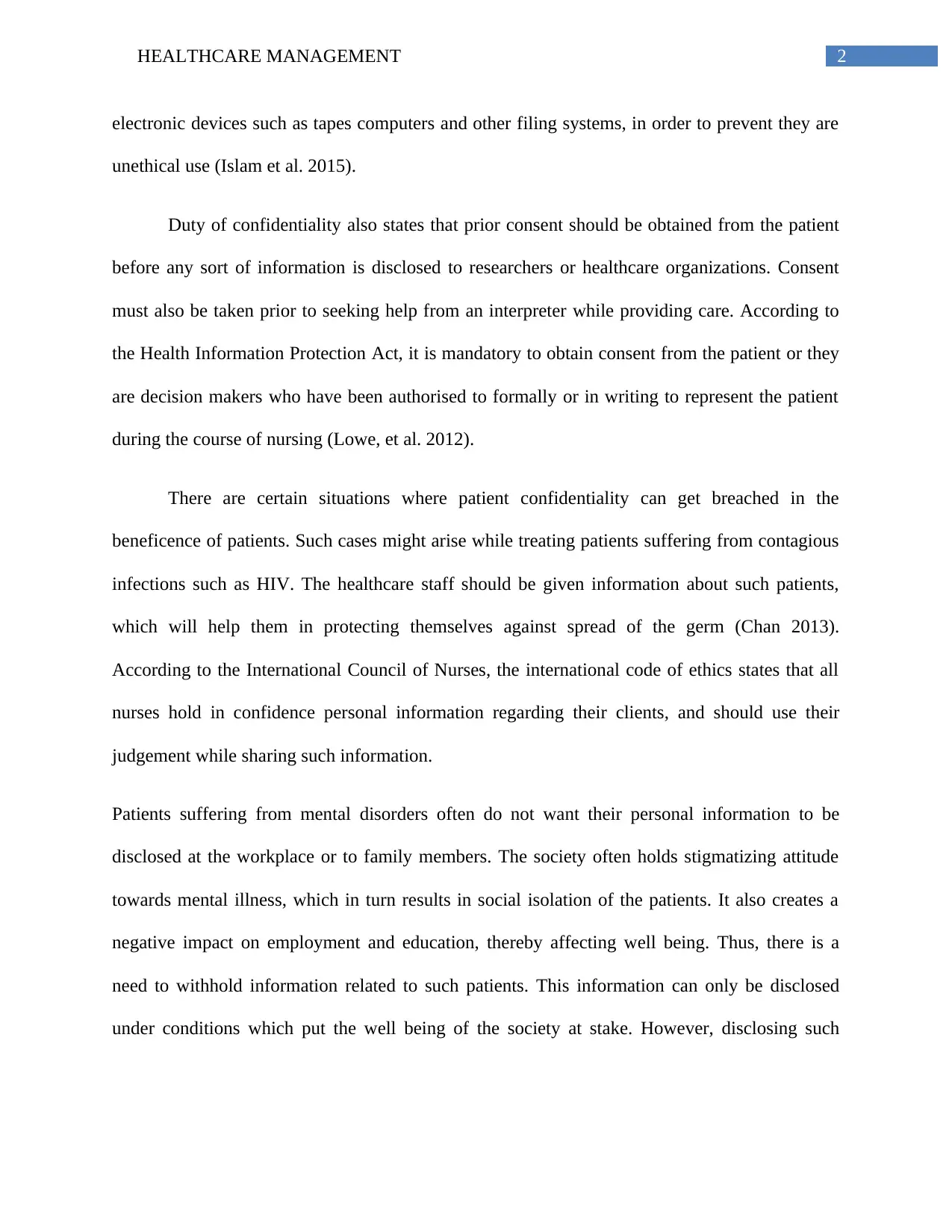
2HEALTHCARE MANAGEMENT
electronic devices such as tapes computers and other filing systems, in order to prevent they are
unethical use (Islam et al. 2015).
Duty of confidentiality also states that prior consent should be obtained from the patient
before any sort of information is disclosed to researchers or healthcare organizations. Consent
must also be taken prior to seeking help from an interpreter while providing care. According to
the Health Information Protection Act, it is mandatory to obtain consent from the patient or they
are decision makers who have been authorised to formally or in writing to represent the patient
during the course of nursing (Lowe, et al. 2012).
There are certain situations where patient confidentiality can get breached in the
beneficence of patients. Such cases might arise while treating patients suffering from contagious
infections such as HIV. The healthcare staff should be given information about such patients,
which will help them in protecting themselves against spread of the germ (Chan 2013).
According to the International Council of Nurses, the international code of ethics states that all
nurses hold in confidence personal information regarding their clients, and should use their
judgement while sharing such information.
Patients suffering from mental disorders often do not want their personal information to be
disclosed at the workplace or to family members. The society often holds stigmatizing attitude
towards mental illness, which in turn results in social isolation of the patients. It also creates a
negative impact on employment and education, thereby affecting well being. Thus, there is a
need to withhold information related to such patients. This information can only be disclosed
under conditions which put the well being of the society at stake. However, disclosing such
electronic devices such as tapes computers and other filing systems, in order to prevent they are
unethical use (Islam et al. 2015).
Duty of confidentiality also states that prior consent should be obtained from the patient
before any sort of information is disclosed to researchers or healthcare organizations. Consent
must also be taken prior to seeking help from an interpreter while providing care. According to
the Health Information Protection Act, it is mandatory to obtain consent from the patient or they
are decision makers who have been authorised to formally or in writing to represent the patient
during the course of nursing (Lowe, et al. 2012).
There are certain situations where patient confidentiality can get breached in the
beneficence of patients. Such cases might arise while treating patients suffering from contagious
infections such as HIV. The healthcare staff should be given information about such patients,
which will help them in protecting themselves against spread of the germ (Chan 2013).
According to the International Council of Nurses, the international code of ethics states that all
nurses hold in confidence personal information regarding their clients, and should use their
judgement while sharing such information.
Patients suffering from mental disorders often do not want their personal information to be
disclosed at the workplace or to family members. The society often holds stigmatizing attitude
towards mental illness, which in turn results in social isolation of the patients. It also creates a
negative impact on employment and education, thereby affecting well being. Thus, there is a
need to withhold information related to such patients. This information can only be disclosed
under conditions which put the well being of the society at stake. However, disclosing such
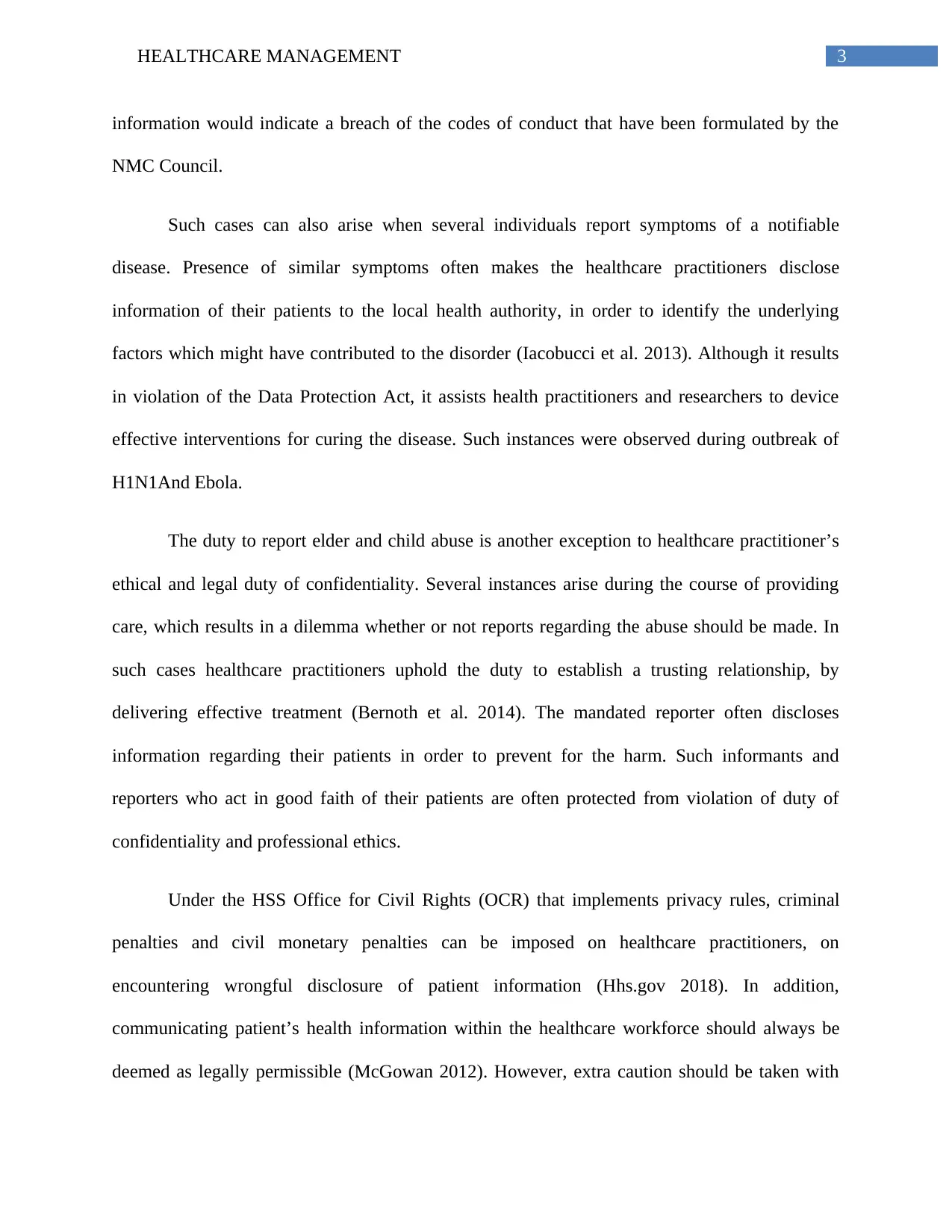
3HEALTHCARE MANAGEMENT
information would indicate a breach of the codes of conduct that have been formulated by the
NMC Council.
Such cases can also arise when several individuals report symptoms of a notifiable
disease. Presence of similar symptoms often makes the healthcare practitioners disclose
information of their patients to the local health authority, in order to identify the underlying
factors which might have contributed to the disorder (Iacobucci et al. 2013). Although it results
in violation of the Data Protection Act, it assists health practitioners and researchers to device
effective interventions for curing the disease. Such instances were observed during outbreak of
H1N1And Ebola.
The duty to report elder and child abuse is another exception to healthcare practitioner’s
ethical and legal duty of confidentiality. Several instances arise during the course of providing
care, which results in a dilemma whether or not reports regarding the abuse should be made. In
such cases healthcare practitioners uphold the duty to establish a trusting relationship, by
delivering effective treatment (Bernoth et al. 2014). The mandated reporter often discloses
information regarding their patients in order to prevent for the harm. Such informants and
reporters who act in good faith of their patients are often protected from violation of duty of
confidentiality and professional ethics.
Under the HSS Office for Civil Rights (OCR) that implements privacy rules, criminal
penalties and civil monetary penalties can be imposed on healthcare practitioners, on
encountering wrongful disclosure of patient information (Hhs.gov 2018). In addition,
communicating patient’s health information within the healthcare workforce should always be
deemed as legally permissible (McGowan 2012). However, extra caution should be taken with
information would indicate a breach of the codes of conduct that have been formulated by the
NMC Council.
Such cases can also arise when several individuals report symptoms of a notifiable
disease. Presence of similar symptoms often makes the healthcare practitioners disclose
information of their patients to the local health authority, in order to identify the underlying
factors which might have contributed to the disorder (Iacobucci et al. 2013). Although it results
in violation of the Data Protection Act, it assists health practitioners and researchers to device
effective interventions for curing the disease. Such instances were observed during outbreak of
H1N1And Ebola.
The duty to report elder and child abuse is another exception to healthcare practitioner’s
ethical and legal duty of confidentiality. Several instances arise during the course of providing
care, which results in a dilemma whether or not reports regarding the abuse should be made. In
such cases healthcare practitioners uphold the duty to establish a trusting relationship, by
delivering effective treatment (Bernoth et al. 2014). The mandated reporter often discloses
information regarding their patients in order to prevent for the harm. Such informants and
reporters who act in good faith of their patients are often protected from violation of duty of
confidentiality and professional ethics.
Under the HSS Office for Civil Rights (OCR) that implements privacy rules, criminal
penalties and civil monetary penalties can be imposed on healthcare practitioners, on
encountering wrongful disclosure of patient information (Hhs.gov 2018). In addition,
communicating patient’s health information within the healthcare workforce should always be
deemed as legally permissible (McGowan 2012). However, extra caution should be taken with
Secure Best Marks with AI Grader
Need help grading? Try our AI Grader for instant feedback on your assignments.
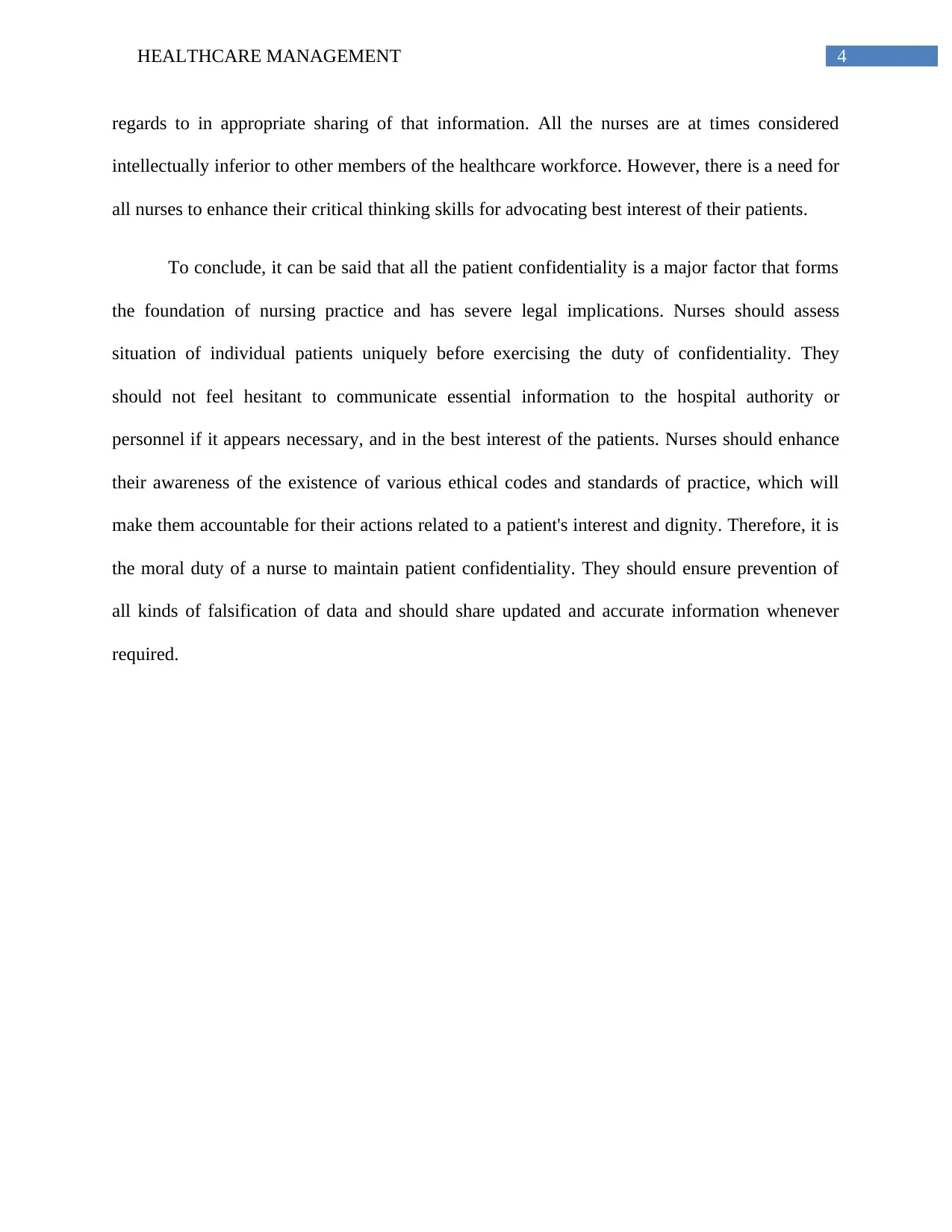
4HEALTHCARE MANAGEMENT
regards to in appropriate sharing of that information. All the nurses are at times considered
intellectually inferior to other members of the healthcare workforce. However, there is a need for
all nurses to enhance their critical thinking skills for advocating best interest of their patients.
To conclude, it can be said that all the patient confidentiality is a major factor that forms
the foundation of nursing practice and has severe legal implications. Nurses should assess
situation of individual patients uniquely before exercising the duty of confidentiality. They
should not feel hesitant to communicate essential information to the hospital authority or
personnel if it appears necessary, and in the best interest of the patients. Nurses should enhance
their awareness of the existence of various ethical codes and standards of practice, which will
make them accountable for their actions related to a patient's interest and dignity. Therefore, it is
the moral duty of a nurse to maintain patient confidentiality. They should ensure prevention of
all kinds of falsification of data and should share updated and accurate information whenever
required.
regards to in appropriate sharing of that information. All the nurses are at times considered
intellectually inferior to other members of the healthcare workforce. However, there is a need for
all nurses to enhance their critical thinking skills for advocating best interest of their patients.
To conclude, it can be said that all the patient confidentiality is a major factor that forms
the foundation of nursing practice and has severe legal implications. Nurses should assess
situation of individual patients uniquely before exercising the duty of confidentiality. They
should not feel hesitant to communicate essential information to the hospital authority or
personnel if it appears necessary, and in the best interest of the patients. Nurses should enhance
their awareness of the existence of various ethical codes and standards of practice, which will
make them accountable for their actions related to a patient's interest and dignity. Therefore, it is
the moral duty of a nurse to maintain patient confidentiality. They should ensure prevention of
all kinds of falsification of data and should share updated and accurate information whenever
required.
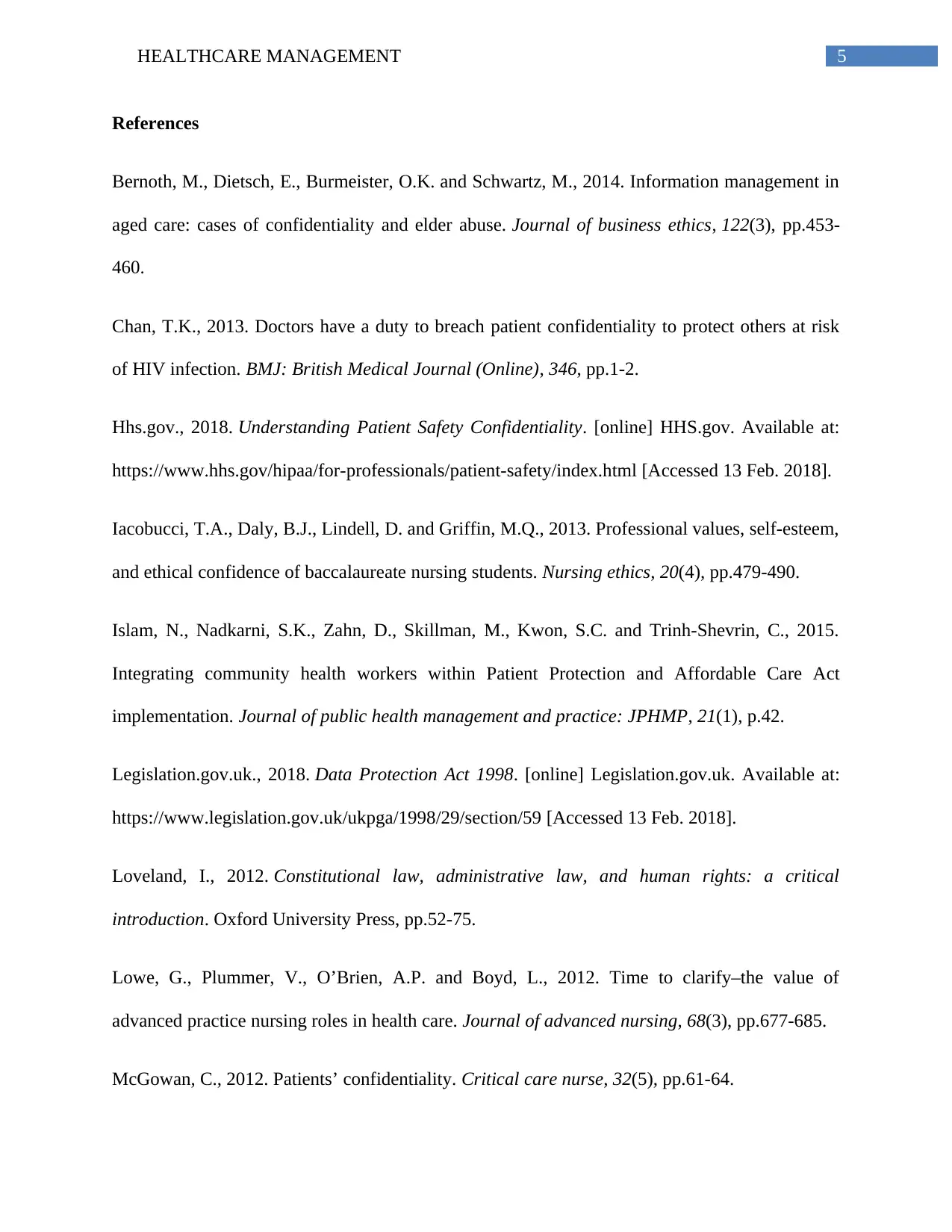
5HEALTHCARE MANAGEMENT
References
Bernoth, M., Dietsch, E., Burmeister, O.K. and Schwartz, M., 2014. Information management in
aged care: cases of confidentiality and elder abuse. Journal of business ethics, 122(3), pp.453-
460.
Chan, T.K., 2013. Doctors have a duty to breach patient confidentiality to protect others at risk
of HIV infection. BMJ: British Medical Journal (Online), 346, pp.1-2.
Hhs.gov., 2018. Understanding Patient Safety Confidentiality. [online] HHS.gov. Available at:
https://www.hhs.gov/hipaa/for-professionals/patient-safety/index.html [Accessed 13 Feb. 2018].
Iacobucci, T.A., Daly, B.J., Lindell, D. and Griffin, M.Q., 2013. Professional values, self-esteem,
and ethical confidence of baccalaureate nursing students. Nursing ethics, 20(4), pp.479-490.
Islam, N., Nadkarni, S.K., Zahn, D., Skillman, M., Kwon, S.C. and Trinh-Shevrin, C., 2015.
Integrating community health workers within Patient Protection and Affordable Care Act
implementation. Journal of public health management and practice: JPHMP, 21(1), p.42.
Legislation.gov.uk., 2018. Data Protection Act 1998. [online] Legislation.gov.uk. Available at:
https://www.legislation.gov.uk/ukpga/1998/29/section/59 [Accessed 13 Feb. 2018].
Loveland, I., 2012. Constitutional law, administrative law, and human rights: a critical
introduction. Oxford University Press, pp.52-75.
Lowe, G., Plummer, V., O’Brien, A.P. and Boyd, L., 2012. Time to clarify–the value of
advanced practice nursing roles in health care. Journal of advanced nursing, 68(3), pp.677-685.
McGowan, C., 2012. Patients’ confidentiality. Critical care nurse, 32(5), pp.61-64.
References
Bernoth, M., Dietsch, E., Burmeister, O.K. and Schwartz, M., 2014. Information management in
aged care: cases of confidentiality and elder abuse. Journal of business ethics, 122(3), pp.453-
460.
Chan, T.K., 2013. Doctors have a duty to breach patient confidentiality to protect others at risk
of HIV infection. BMJ: British Medical Journal (Online), 346, pp.1-2.
Hhs.gov., 2018. Understanding Patient Safety Confidentiality. [online] HHS.gov. Available at:
https://www.hhs.gov/hipaa/for-professionals/patient-safety/index.html [Accessed 13 Feb. 2018].
Iacobucci, T.A., Daly, B.J., Lindell, D. and Griffin, M.Q., 2013. Professional values, self-esteem,
and ethical confidence of baccalaureate nursing students. Nursing ethics, 20(4), pp.479-490.
Islam, N., Nadkarni, S.K., Zahn, D., Skillman, M., Kwon, S.C. and Trinh-Shevrin, C., 2015.
Integrating community health workers within Patient Protection and Affordable Care Act
implementation. Journal of public health management and practice: JPHMP, 21(1), p.42.
Legislation.gov.uk., 2018. Data Protection Act 1998. [online] Legislation.gov.uk. Available at:
https://www.legislation.gov.uk/ukpga/1998/29/section/59 [Accessed 13 Feb. 2018].
Loveland, I., 2012. Constitutional law, administrative law, and human rights: a critical
introduction. Oxford University Press, pp.52-75.
Lowe, G., Plummer, V., O’Brien, A.P. and Boyd, L., 2012. Time to clarify–the value of
advanced practice nursing roles in health care. Journal of advanced nursing, 68(3), pp.677-685.
McGowan, C., 2012. Patients’ confidentiality. Critical care nurse, 32(5), pp.61-64.
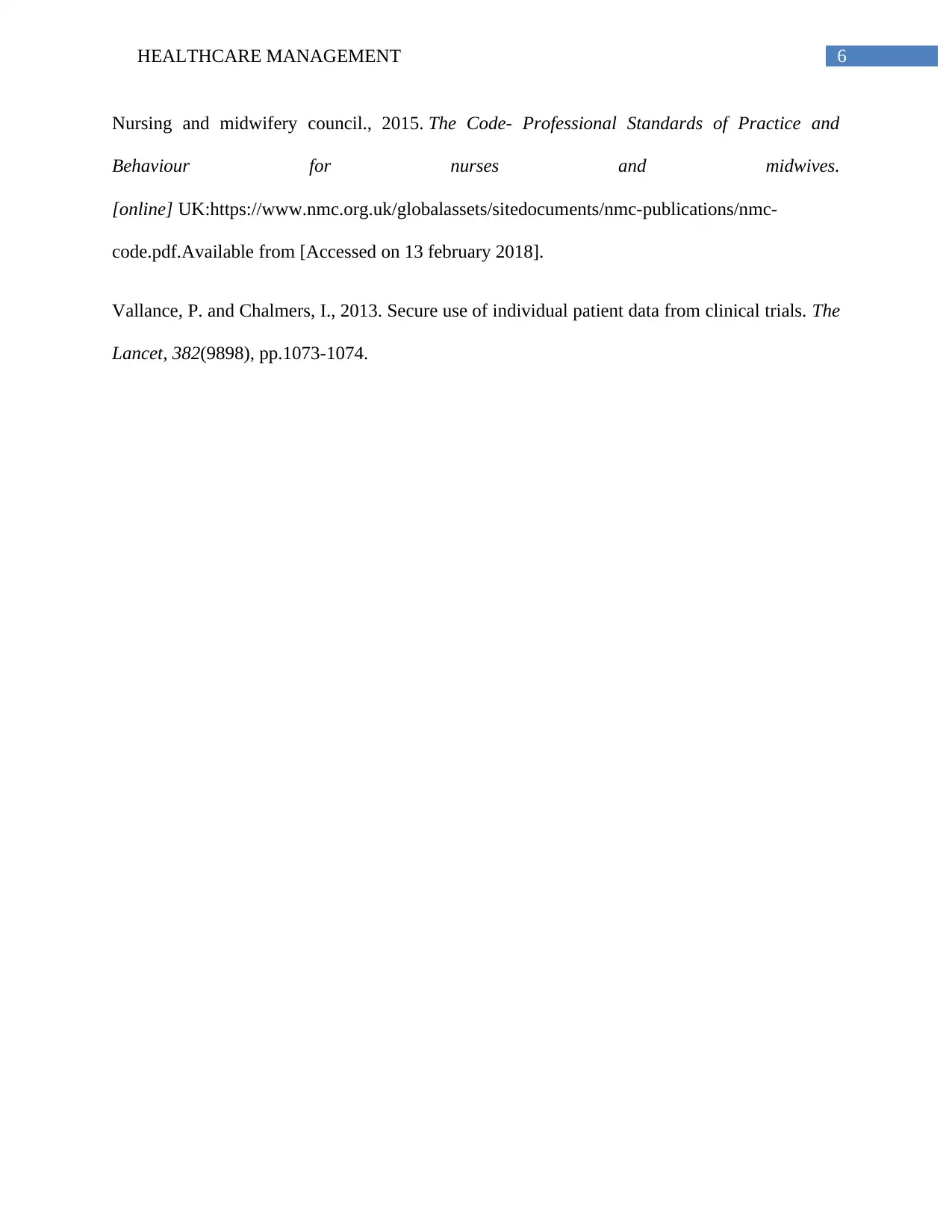
6HEALTHCARE MANAGEMENT
Nursing and midwifery council., 2015. The Code- Professional Standards of Practice and
Behaviour for nurses and midwives.
[online] UK:https://www.nmc.org.uk/globalassets/sitedocuments/nmc-publications/nmc-
code.pdf.Available from [Accessed on 13 february 2018].
Vallance, P. and Chalmers, I., 2013. Secure use of individual patient data from clinical trials. The
Lancet, 382(9898), pp.1073-1074.
Nursing and midwifery council., 2015. The Code- Professional Standards of Practice and
Behaviour for nurses and midwives.
[online] UK:https://www.nmc.org.uk/globalassets/sitedocuments/nmc-publications/nmc-
code.pdf.Available from [Accessed on 13 february 2018].
Vallance, P. and Chalmers, I., 2013. Secure use of individual patient data from clinical trials. The
Lancet, 382(9898), pp.1073-1074.
1 out of 7
Related Documents
Your All-in-One AI-Powered Toolkit for Academic Success.
+13062052269
info@desklib.com
Available 24*7 on WhatsApp / Email
![[object Object]](/_next/static/media/star-bottom.7253800d.svg)
Unlock your academic potential
© 2024 | Zucol Services PVT LTD | All rights reserved.




